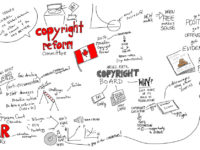In recent months, Canadian Heritage Minister Steven Guilbeault has emerged as the de facto digital policy lead minister in Canada with Navdeep Bains largely silent on the race to regulate everything from online linking to how Canadian content is promoted on digital streaming services. New legislation is still forthcoming, but recent comments to industry town halls and press reports provide a good sense of what Guilbeault has in mind. In short, it appears the government will establish an extensive regulatory structure for digital services with registration or licensing requirements and mandated payments for a host of online activities. The amounts payable will be established through hearings at the CRTC and the Copyright Board of Canada. The government would retain the power to fine companies that fail to comply with the payment requirements and use a policy direction to the CRTC to make its policy intentions clear.
Post Tagged with: "Copyright Board"
Misleading on Fair Dealing, Part 1: Access Copyright’s Inconsistent Claims on the Legal Effect of the 2012 Fair Dealing Reforms
Fair dealing has unsurprisingly emerged as one of the dominant topics of the ongoing Canadian copyright review. While educational institutions maintain that spending on content has increased since the 2012 reforms that added education to the list of fair dealing purposes, Access Copyright and the publishing community argue that licensing revenues have declined. Starting today, I’ll be posting a series on fair dealing that unpack many of the issues and demonstrate why House of Commons committees studying the issue may have been misled by exaggerated and inaccurate claims.
The series starts with the foundational argument from Access Copyright and its supporters, namely that current educational practices are the result of the 2012 copyright reforms that led to a significant expansion of fair dealing. The implication is that the government broke their compensation system in 2012 and should “fix it” by curtailing educational use of fair dealing. Future posts will explain why licensing has actually increased since 2012, but this post is limited to the oft-heard claim that the 2012 reforms are to “blame” for current educational practices.
Tinkering With Copyright in Bill C-68: My Appearance Before the Standing Committee on Finance
I appeared earlier this week before the House of Commons Standing Committee on Finance as part of its review of Bill C-86, the Budget Implementation Act. The bill features extensive intellectual property provisions arising out of the IP strategy referenced in Budget 2018. My comments were consistent with previous posts on the changes to notice-and-notice, patents, and the Copyright Board. My opening remarks are posted below.
Canadian Government Rejects Access Copyright’s Demand for Statutory Damages
Earlier this year, I wrote about lobbying pressure to “harmonize” statutory damages for copyright collectives. Access Copyright, which supported the measure, argued that the massive escalation in potential damage awards were needed for three reasons: deterrence, promotion of settlement negotiations, and efficient use of court resources. Yet as I argued in this post, none of the arguments rang true.
After months of internal wrangling, the government unveiled its proposed reforms to the Copyright Board yesterday as part of Bill C-86, its Budget Implementation Act. The bill contains many changes requested by copyright stakeholders. With respect to the statutory damages provisions, however, it has rightly left the statutory damages distinction between certain collectives in place, meaning that Access Copyright will not be able to rely on statutory damages for non-payment of tariffs, relying instead on actual damages (if any).











